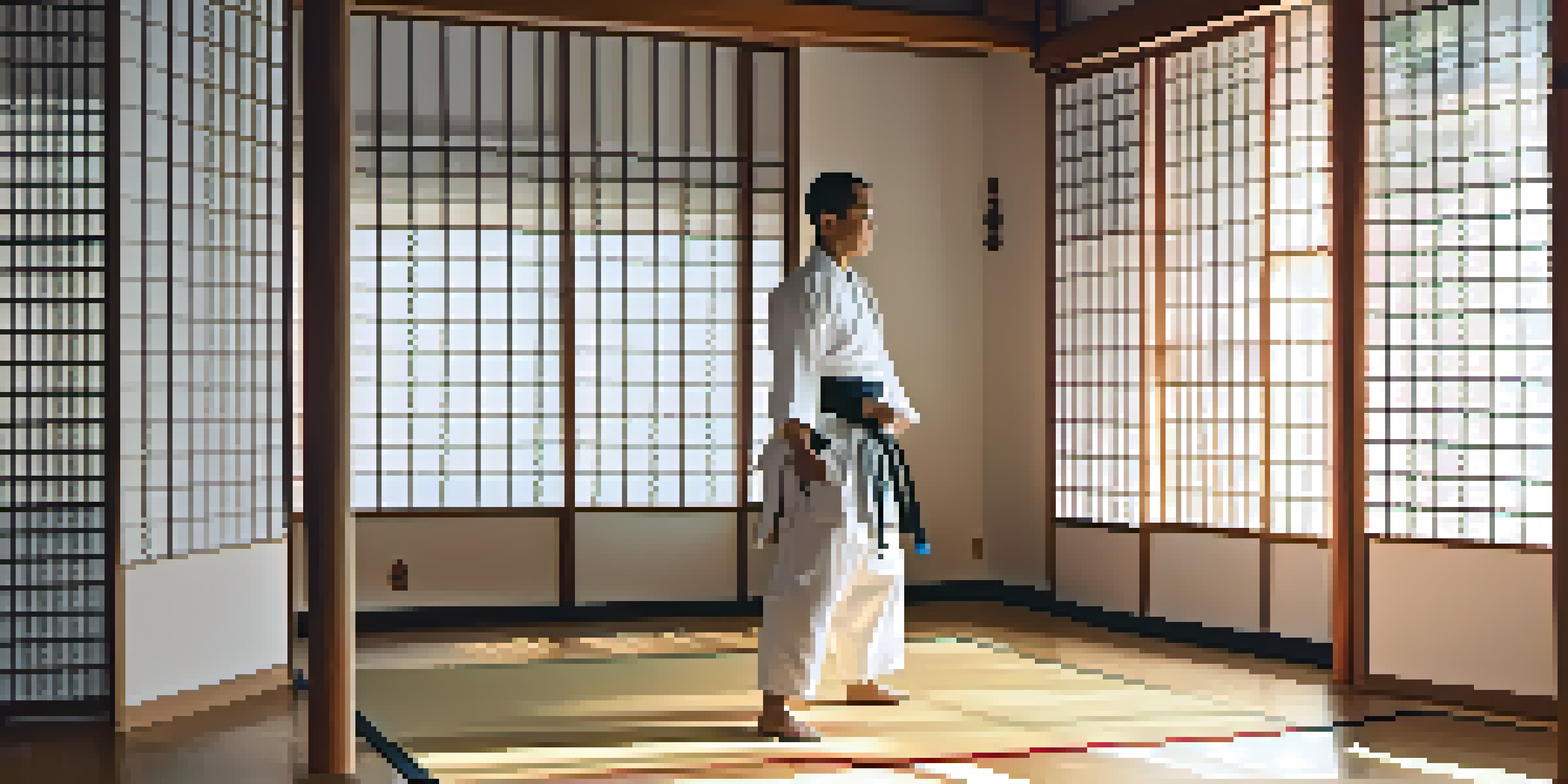Applying Martial Arts Philosophy to Everyday Conflicts

Understanding the Core Principles of Martial Arts
Martial arts isn't just about physical combat; it's also rooted in deep philosophical principles. At its core, martial arts teaches respect, discipline, and self-awareness. These values are essential not only in the dojo but in everyday life as well. By embracing these principles, we can approach conflicts with a clearer mindset and a more open heart.
The greatest victory is that which requires no battle.
For example, the concept of 'dojo' translates to 'place of the way,' suggesting that every situation is a chance for growth. This idea encourages us to view conflicts not as battles to win, but as opportunities to learn. When we shift our perspective, we become more equipped to handle disputes with grace and understanding.
Ultimately, understanding these core principles allows us to navigate the complexities of life. Just like in martial arts, where we practice techniques repeatedly, applying these philosophies in our daily interactions can lead to more harmonious relationships.
The Power of Mindfulness in Conflict Resolution
Mindfulness, a key component of many martial arts, can be incredibly effective in resolving conflicts. By being present in the moment, we can better assess our emotions and reactions. This awareness helps prevent knee-jerk responses that often escalate conflicts rather than resolve them.

Imagine you're in a heated argument. Instead of reacting impulsively, mindfulness allows you to pause and reflect. This moment of stillness can create space for thoughtful responses, helping to diffuse tension. By applying this approach, you can communicate more effectively and listen more deeply.
Mindfulness Enhances Conflict Resolution
Being present allows us to respond thoughtfully rather than react impulsively during conflicts.
Ultimately, mindfulness encourages a more compassionate approach to conflict. When we take the time to understand our own feelings and those of others, we pave the way for resolution and understanding.
Embracing Adaptability and Flexibility
In martial arts, adaptability is crucial; fighters must adjust their strategies based on opponents’ moves. This principle translates beautifully into conflict resolution. By remaining flexible, we can navigate disagreements with a mindset that prioritizes collaboration over confrontation.
In the midst of movement and chaos, when there is clarity, there is no conflict.
For instance, if a colleague disagrees with your approach on a project, instead of sticking rigidly to your plan, consider their perspective. This willingness to adapt can lead to innovative solutions that benefit everyone involved. It’s about finding common ground rather than winning at all costs.
By embracing adaptability, we cultivate a more constructive environment. This not only helps in resolving conflicts but also strengthens our relationships, making us more effective communicators and collaborators.
The Importance of Respect in Every Interaction
Respect is a fundamental value in martial arts, teaching practitioners to honor their instructors, peers, and even their opponents. This principle is equally important in conflict resolution. When we approach conflicts with respect, we create a foundation for open and honest dialogue.
Consider a situation where someone criticizes your work. Instead of responding defensively, showing respect for their opinion can lead to a productive discussion. This respect fosters an environment where everyone feels valued and heard, making it easier to resolve disputes effectively.
Adaptability Fosters Cooperation
Embracing flexibility in our approach helps us find common ground and innovative solutions in disagreements.
Incorporating respect into our interactions not only smooths over conflicts but also builds trust and rapport. As we cultivate this value, our relationships flourish, creating a community that thrives on mutual understanding.
Practicing the Art of Patience
Patience is a virtue emphasized in martial arts training. It teaches us that mastery comes with time and effort, a lesson that can be applied to conflict resolution. When faced with a disagreement, exercising patience allows us to process our emotions and reflect before reacting.
Imagine a scenario where tensions are high during a team meeting. Instead of rushing to defend your point, taking a moment to breathe and gather your thoughts can lead to a more constructive outcome. This practice not only calms the situation but also promotes thoughtful communication.
By practicing patience, we show that we value the process of resolution as much as the outcome. This approach invites collaboration, encouraging all parties to contribute to a more harmonious solution.
Finding Balance Through Conflict
One of the key teachings of martial arts is the importance of balance, both physically and mentally. In conflicts, achieving balance means recognizing the needs and emotions of all parties involved. This perspective helps us understand that conflicts are not one-sided; they involve multiple viewpoints.
When we approach a conflict with the intention of finding balance, we are more likely to seek solutions that satisfy everyone. For instance, during a disagreement with a friend, focusing on finding a compromise rather than asserting dominance can lead to a more satisfying resolution for both parties.
Respect Builds Trust in Dialogue
Approaching conflicts with respect creates a foundation for open communication and productive discussions.
Balancing our interests with those of others fosters a sense of community and cooperation. By prioritizing balance, we create a more peaceful and productive environment for ourselves and those around us.
Transforming Conflicts into Opportunities for Growth
In martial arts, every challenge is seen as a chance to grow stronger and more skilled. This mindset can be incredibly beneficial when facing conflicts in everyday life. Instead of viewing disputes as negative experiences, we can reframe them as opportunities to learn and improve ourselves.
For example, when conflicts arise in a work setting, they can highlight gaps in communication or team dynamics. By addressing these issues constructively, we not only resolve the immediate conflict but also strengthen our team's overall resilience.

By embracing the idea that conflicts can lead to personal and collective growth, we foster a more positive outlook on challenges. This perspective encourages us to approach disagreements with curiosity rather than fear, paving the way for lasting improvements.